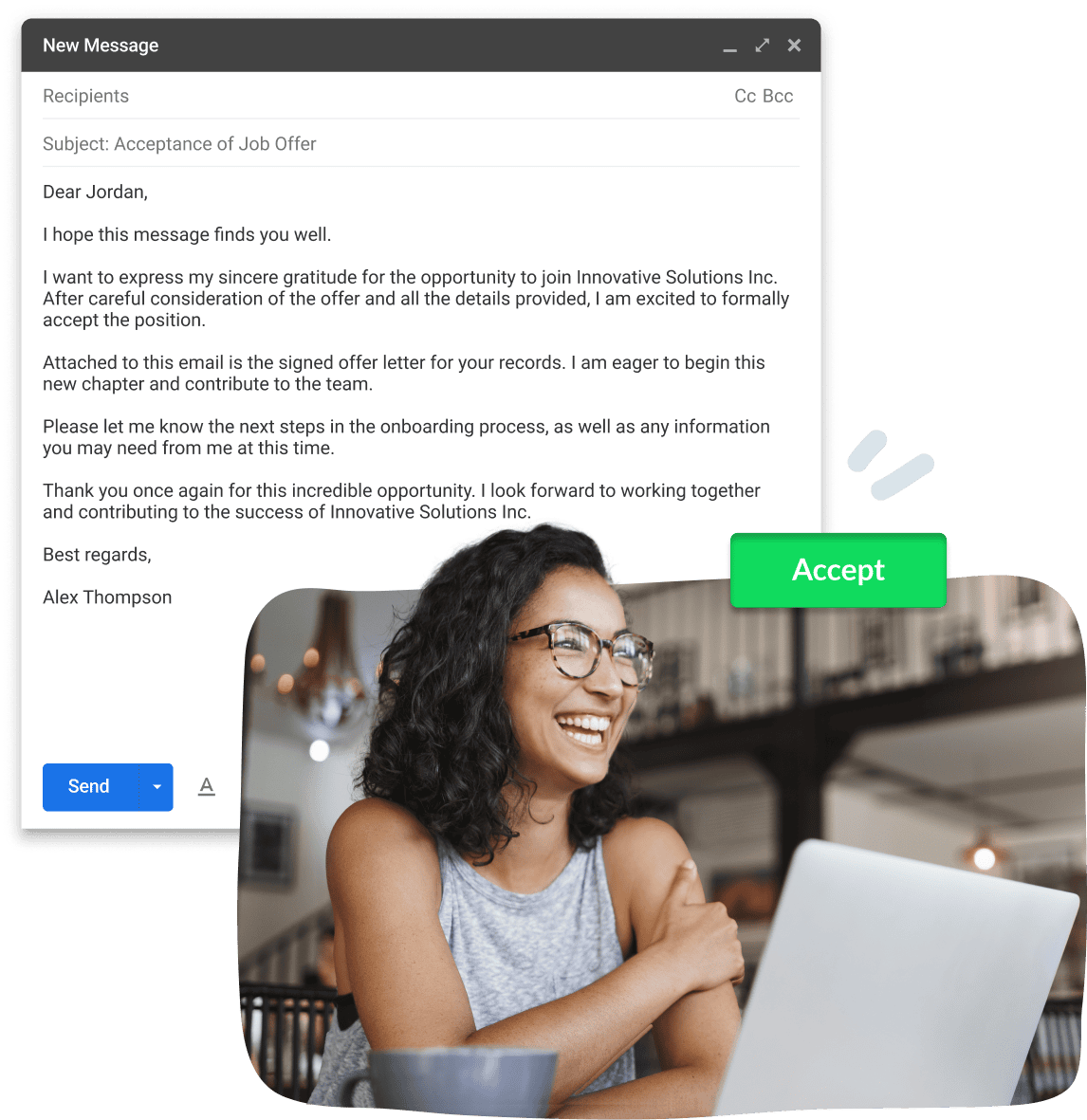
How To Conduct a Structured Interview
Learn how to conduct structured interviews effectively with our comprehensive guide.

There are few things more exciting in life than receiving a job offer, particularly when it’s with a company that you’d love to join. So, upon seeing that an offer letter or email comes in, many people will default to saying “yes” without considering the potential consequences. There are various strategies and steps you will want to take before accepting a job offer that will result in a better outcome for yourself.
Before you proceed, take note: Some of the tips on how to accept a job offer may sound scary or risky, especially if you’re feeling desperate to find a job. That said, always weigh the risks and rewards and try to achieve the best possible result for yourself.

Job hopping is exceptionally common, especially among Millennials. Gallup notes that around 60% of Millennials are open to other job opportunities. By age 26, the average Millennial had already had six jobs. Meanwhile, the Bureau of Labor Statistics reports their parents (Boomers) held around 12 jobs during their working careers.
This matters for two reasons:
It’s tempting to reply “yes” to a job offer and sign the contract immediately. Yet, in doing so, you may overlook critical details about the role, lose your chance to negotiate for better compensation or miss out on potentially better opportunities. Instead of putting your signature on the offer letter as soon as it comes in, take some time to think through all of the following factors.
Staffing company Robert Half found that 60% of job applicants have received multiple job offers. Whether or not that happens to you will depend on a few circumstances converging:
If all of those are true, then there’s a chance the job offer you received may not be the only one you get. If that’s the case, there’s also a chance that you could receive a better job offer.
In this situation, it may be prudent to wait a few days before saying yes to the offer. Delaying does not mean going silent, however. If you’re in this situation and you’re inclined to wait to say yes, send the company an email that looks something like this:
Hi [Hiring Manager]:
I am so excited to hear back from you and to have the opportunity to work at [Company Name]. I know I’ll be a great asset to the company! If possible, can I have a few days to consider the offer? I’m very much inclined to say yes, but I want to make sure I’ve given myself adequate time to review and consider the details of the contract before I sign.
Most employers will give you some leeway and allow you a few days.
However, you may receive a conditional job offer or an offer that expires after a certain amount of time after you’ve received it. Depending on the amount of time you have before the offer expires, you may be forced to say yes.
In either case, be proactive. If you’ve interviewed well at other companies and want to hear back, email their hiring managers and let them know that you’ve received an offer. This may get them to expedite your offer so that they have a chance of getting you on board. The email you send could look something like this:
Hi [Hiring Manager]:
I appreciate the time you took to connect with me and help me learn more about [Company Name]. The role sounds exciting, and it would be an excellent fit for me. I recently received a job offer from a different company, but I am still interested in working for [Company Name]. If you are still considering me for the role, would it be possible to send me an offer letter within the next 24 hours? We connected well during the interview, and I am still very interested in joining your team!
There are some potential benefits to naming the other company that sent you an offer letter. For example, it may be a direct competitor. In most cases, it’s ok to keep that information out of the emails you send to other companies that may still be considering your candidacy.
The written contract you receive from a potential employer may be dense, with details hidden deep within a significant amount of legalese. Still, it’s essential that you read through the contract completely before you sign. Look for anything within the contract that might raise some red flags in different areas, including:
Make sure everything in the contract lines up with what you discussed in your interviews, as well as what was spelled out in the job posting. Variances could just be an oversight, as many hiring managers will use a template for each job offer acceptance email and contract. However, the company may also be trying to change the nature of the agreement from what was discussed.
If your offer letter checks all of the boxes and you don’t have any other offers that you want to pursue, then it’s time to accept your job offer! How you accept the job offer may depend on the way the offer was received, but there are generally three formats to consider:
We’ll briefly cover what you need to know for each of these formats.
You may be inclined to accept a job offer by phone, especially if that’s how you received the offer through voice mail. Accepting a job offer by phone is a great way to add a personal touch to the acceptance, and the phone call does not have to be long or complicated. It could look something like this:
Hi [Hiring Manager!] This is [Your Name]. Thank you for the offer to work at [Company Name]. I’m calling to let you know that I’m accepting the offer. I’d love to discuss any additional details and next steps with you.
Note: Never accept a job offer by phone immediately! If you received and answered a call from the hiring manager offering you the job, let them know how excited you are. Then, ask them to send you the offer letter by email or mail so you can have time to review the details before accepting.

Most job offers now come in through email, which means sending a job offer acceptance email is an exceptionally common practice. Your email does not need to be long or complicated. It can read similar to the following:
Hi [Hiring Manager]:
Thank you for the offer to work at [Company Name]. After reviewing all of the details, I am happy to inform you that I’m accepting the offer. The signed offer letter is attached. I look forward to hearing from you and getting started on the next steps.
If you have not received the official offer letter or employment contract yet, your email may look a bit different:
Hi [Hiring Manager]:
Thank you for the offer to work at [Company Name]. I am happy to inform you that I’m accepting the offer! At your earliest convenience, please send me the contract to sign, as well as details about the next steps.

If you received an offer letter through the mail, you may also need to respond to that letter by sending the signed acceptance letter. If this is the case, sign the offer letter (after reading it thoroughly) and send it back in the mail using priority shipping so that it gets there faster.
However, it’s unlikely that your job offer will only come through the mail. You likely will have already received a verbal offer through email or on the phone. A physical mail offer letter that requires a signature is less common but still a practice some companies utilize for various reasons.

After you have accepted a job offer, most of what happens next is the responsibility of the company that is hiring you. If their hiring team is expedient, you will get all of the onboarding materials by the date the company has noted after you signed the offer letter.
Depending on your current situation, there may be a few things you need to handle on your side:
Above all, take some time to celebrate. Starting a new job can be exciting, and you deserve to celebrate your success!

You can politely accept a job offer by making sure to thank the hiring manager and hiring team for the offer. It’s also a good idea to send individual thank you notes to anyone who was part of the interview process, including future team members and leaders who you will be working with once you start your new job.
It’s commonly a best practice to give your future employer 24-48 hours before you accept their job offer, even if it’s your only option. This will give you time to think through the pros and cons of accepting the job and review the offer letter and other documentation the company has sent over. However, circumstances may vary, so you may want or need to accept the offer immediately.
While you can negotiate a job offer after accepting it, this may not be a good idea. Most potential employers will say no to any negotiation attempts after the offer is accepted, especially once you’ve already signed the employment contract. That doesn’t mean you can’t, and there may be circumstances where it makes sense to try, such as receiving a better offer after you accept the current one. Most employers won’t look too kindly on post-acceptance negotiating, so try to get all of your negotiation done before you accept the job offer.
Modernize your hiring process with expert insights and advice.